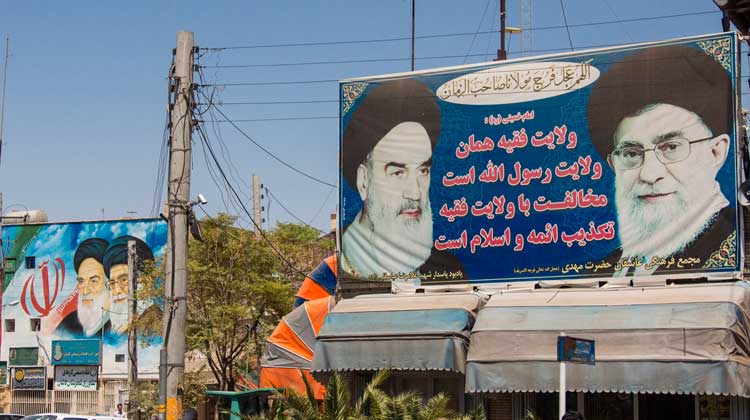
In the wake of President Trump’s decision to scrap U.S. participation in the Joint Comprehensive Plan of Action (JCPOA), lawmakers in Iran’s parliament burned an image of the American flag and shouted “Death to America!” on Wednesday. Leaders in France, Germany, and the United Kingdom released a statement Tuesday vowing continued commitment to the deal, while Bahrain, Saudi Arabia, and the United Arab Emirates supported the president’s move.
Speaking Tuesday on the The Mark Levin Show, National Security Advisor John Bolton detailed the reasons for the president’s move in a debate that has ebbed and flowed since the deal’s adoption in 2015.
“The most effective way to stop Iran from getting deliverable nuclear weapons is give up the charade that this deal was having any effect on them and get down to putting real pressure back on—pressure that Obama never should have released,” Bolton said. “But the point here—as the president has put it—is maximum sanctions on Iran to make sure they don’t get the revenue that they need to conduct their ballistic missile research, their nuclear research, their terrorist activities around the world—supporting groups like Hamas and Hezbollah—and their armed intrusion into many countries in the Middle East—like Syria, like Yemen, like Iraq.
Sanctions against Iran suspended in 2015 immediately are in effect again, although Bolton added that there’s a “wind-down” provision for some contracts. In looking back on the JCPOA, Levin asked Bolton exactly what the 2015 agreement did, and Bolton noted a main component was easing economic pressure on Iran.
“That’s why Iran loves this deal; it’s why Iran was never going to renegotiate its terms,” he said. “The only thing they regretted [in] Tehran is they didn’t ask Obama and [former Secretary of State John] Kerry for more concessions, because if they had, they would have gotten more concessions.”
Even with European leaders protesting the president’s decision, Bolton said it might be difficult for them to try to skirt sanction provisions, as American technology is part of many European goods.
“[W]e’re going to be in conversation with the Europeans … to talk about how to move from the failed deal to the larger question of all of Iran’s objectionable conduct in the Middle East and around the world,” Bolton added. “That was one of the basic flaws of the Obama/Kerry deal with Iran is that it only addressed the nuclear issue and not the broader malign influence of Iran.”
Bolton also addressed the fact that even some Republicans were against the president’s move to end participation in the JCPOA.
“I think the president obviously respects their views, but as he put it, you can’t build on a rotten, broken foundation, and to look at how to achieve our broader objectives,” he said. “[T]he only way is to create a different reality for the Iranian regime and for the Europeans and try and cut off a lot of the investment funds that are going to go into Iran.”
Bolton reiterated the fact that Iran only responds to pressure, and since the deal in 2015, things have gotten worse in the Middle East in places such as Iraq, Syria, and Yemen.
“We’re going to get a lot of support for the president’s action from the Arab states in the region—from Israel, from others who understand the threat that Iran poses, and we’re going to continue to work hard on this,” he said. “We’re just not going to give Iran the free pass that the Obama administration gave.”
Democrats lined up after Trump’s decision to slam the president’s move.
Sen. Bob Menendez (D-N.J.) called the president’s move reckless.
“Today’s withdrawal from the JCPOA makes it more likely Iran will restart its nuclear weapons program in the future,” he said in a statement. “The governments of Iran, Russia, and China will seize this opportunity of self-imposed U.S. isolation to continue major weapons sales, deepen economic ties, and further challenge the United States and Europe not only in the Middle East but in other areas like North Korea.”
Rep. Nancy Pelosi (D-Calif.) called the JCPOA “a great diplomatic achievement” and also blasted the president.
“Our allies will hold up their end of the agreement, but our government will lose its international credibility and the power of our voice at the table,” she said in a statement released by her office. “The president’s decision to abdicate American leadership during a critical moment in our effort to advance a denuclearization agreement with North Korea is particularly senseless, disturbing, and dangerous.”
Some Republicans weren’t onboard with the president either.
Sen. Jeff Flake (R-Ariz.) said on Twitter that exiting the deal doesn’t serve the national interest.
“Iran has already realized the benefits of sanctions relief and the release of frozen assets,” he wrote. “Now they are let off the hook when it comes to honoring their nuclear obligations under the agreement.”
Sen. Marco Rubio (R-Fla.) praised the presidents move referring to the “flawed” JCPOA.
“This agreement was so bad that bipartisan majorities in both chambers of Congress voted against it after the last administration refused to submit it as a legally-binding treaty under the Constitution,” Rubio said in a statement. “The deal enriched [the] Iranian regime and empowered it to destabilize the Middle East.”
After the decision, Israeli Prime Minister Benjamin Netanyahu took to twitter to celebrate Trump’s move as well.
“Israel fully supports @realDonaldTrump’s bold decision today to reject the disastrous nuclear deal with the terrorist regime in Tehran,” Netanyahu wrote. “The deal didn’t push war further away; it actually brought it closer. The deal didn’t reduce Iran’s aggression; it dramatically increased it.”
© 2018 Homeland411